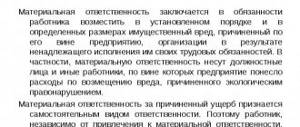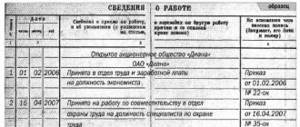Source: Journal “Human Resources Department of a State (Municipal) Institution”
Sometimes an employee has to be transferred to another job for some time. Such a need can be caused by a number of reasons - medical indications, production needs, etc. However, not everything is so simple with the transfer procedure. For example, some people confuse a transfer with a transfer and do not formalize it properly or underpay wages when transferring to a lower-paid position. You will learn in what cases temporary transfers are possible, how to distinguish them from transfers, in what amount to pay the temporarily transferred employee and how to document all this by reading the article.
Instead of a preface
In accordance with Art. 72.1 of the Labor Code of the Russian Federation, transfer means a permanent or temporary change in the labor function of an employee and (or) the structural unit in which the employee works, while continuing to work for the same employer, as well as transfer to work in another location together with the employer.
Please note that a change in a structural unit will be considered a transfer only if its name was fixed in the employment contract (for example, in the form of the phrase “The employee is hired as an accountant in the financial and economic department”).
Since today we are considering temporary transfers, it is worth noting that they can be carried out either with or without the employee’s consent.
TYPES OF TRANSLATIONS
Transfer to another job is regulated by Art. 72.1 of the Labor Code of the Russian Federation. There are four cases of transfers:
1. Transfer to another position (permanent or temporary change in the employee’s job function).
2. Transfer to another department (permanent or temporary change in the employee’s job function). 3. Transfer to work in another locality or place (transfer to work in another area together with the employer).
4. Transfer to a permanent job with another employer (at the written request of the employee or with his written consent).
PLEASE NOTE All types of transfers are allowed only with the written consent of the employee and in the absence of medical contraindications (Article 72, 72.1 of the Labor Code of the Russian Federation).
Temporary transfer with the consent of the employee
To carry out a temporary transfer, an agreement must be concluded in writing.
The employer first offers the employee a vacant position or a position where an absent employee needs to be replaced. Then, if agreed, an additional agreement is concluded on a temporary transfer to another job, position or to another structural unit. And first of all, let's talk about the timing of such a transfer. A temporary transfer to another job with the same employer is possible for a period of up to one year, and in the case where such a transfer is carried out to replace a temporarily absent employee, whose place of work is retained in accordance with the law, until this employee returns to work.
We note that by virtue of Part 4 of Art. 72.1 of the Labor Code of the Russian Federation, it is prohibited to transfer or relocate an employee to a job that is contraindicated for him due to health reasons. That is, if there are no medical contraindications and the employee agrees, then he can be temporarily transferred to work even with harmful or dangerous working conditions.
When concluding a transfer agreement, fix in it the basis for the transfer, its duration, the employee’s new responsibilities, as well as other conditions that differ from those established by the employment contract.
Let's talk separately about the wording of the transfer deadline. If a temporary transfer is carried out to a vacant position, you can determine a specific end date for the transfer, and if to replace a temporarily absent employee, it is better to indicate the condition upon the occurrence of which the employee returns to his workplace, because the absent employee may return to work later (for example, when extending vacation or certificate of incapacity for work). For the latter case, the wording may be as follows: “This additional agreement is valid until the date of the leading specialist E. D. Gulkina’s return to work from maternity leave.”
Based on the agreement signed by the parties, a transfer order is issued in the unified form T-51] (T-5a). It is important to indicate in the “Type of transfer” line that the transfer is temporary. The employee must be familiarized with such an order against signature.
The next step in registering a temporary transfer will be to make an entry about it in section. III personal card “Hiring and transfers to another job” (form T-2 or T-2 GS (MS)).
But an entry about a temporary transfer is not made in the work book. This rule is established by Part 4 of Art. 66 of the Labor Code of the Russian Federation and clause 4 of the Rules for maintaining and storing work books [2], according to which entries only about permanent transfers are made in the work book.
note
If an employee is transferred to another job or position, he must be familiarized with the job description and other local regulations relevant to the performance of this work. In addition, you may need to conduct safety training or enter into a liability agreement.
Let us note that the employer should control the end of the temporary transfer, since by virtue of Part 1 of Art. 72.2 of the Labor Code of the Russian Federation , if at the end of the transfer period the employee’s previous job is not provided, and he did not demand its provision and continues to work, then the condition on the temporary nature of the transfer loses force and the transfer is considered permanent. In this regard, the question arises: is it necessary to somehow formalize the provision of the previous job? Labor legislation does not contain requirements for processing the return of an employee. In the meantime, we recommend doing this. Usually, for this purpose, an order (instruction) is issued to terminate the performance of duties in a temporary position and return to the performance of duties in the main position. He might look like this.
State Autonomous Institution of the Arkhangelsk Region
"Sports Training Center"
ORDER
August 20, 2014 No. 84
Arkhangelsk
Due to the expiration of the temporary transfer period by agreement of the parties
I ORDER:
1. Olga Viktorovna Pshenitsyna, who temporarily, by agreement of the parties dated 04/04/2014 No. 2, held the position of deputy head of the sports teams support department, to begin work stipulated by the employment contract dated 06/12/2010 No. 10‑06, as the chief specialist of the sports teams support department teams, since August 21, 2014
2. The accounting department will accrue O. V. Pshenitsyna’s wages in accordance with the staffing schedule for the position of chief specialist in the department for supporting sports teams.
Director Zlakov I. I. Zlakov
I have read the order. Pshenitsyna, 08/20/2014
It may happen that the main employee quits or the temporarily filled position is completely vacant, and the management of the organization, and even the temporary employee himself, is not against making the temporary transfer permanent. In this case, it is necessary to conclude another additional agreement, indicating in it that the temporary transfer made under the agreement from such and such a date is considered permanent. Based on the agreement signed by the parties, it is necessary to issue an order in any form, which also stipulates that the condition on the transfer period has become invalid.
Note that there is a nuance in this situation. When transforming a temporary transfer into a permanent one, it is necessary to make an entry in the work book. Moreover, the date of transfer will be considered the first day of the temporary transfer.
Example
By agreement of the parties, from February 3, 2014, the employee of the State Budgetary Institution was transferred to the position of foreman of the road maintenance section for six months. After this period, the parties signed an agreement that the transfer is considered permanent. How to make an entry in the work book?
| № records | date | Information about hiring, transfer to another permanent job, qualifications, dismissal (indicating reasons and reference to the article, clause of the law) | Name, date and number of the document on the basis of which the entry was made | ||
| number | month | year | |||
| 1 | 2 | 3 | 4 | ||
| … | … | … | … | … | … |
| State budgetary institution | |||||
| Vladimir region "Management | |||||
| highways" | |||||
| 8 | 09 | 12 | 2012 | Hired as a leader | Order dated 12/09/2012 |
| specialist expert. | № 22 | ||||
| 9 | 03 | 02 | 2014 | Transferred to the position of chief | Order dated 02/03/2014 |
| work acceptance department | № 16* | ||||
| for repairs and maintenance | Order dated July 28, 2014 | ||||
| highways. | № 47** | ||||
* Temporary transfer order.
** Order to invalidate the condition on the temporary nature of the transfer.
Please note that if an employee does not start work under an employment contract, that is, wants to continue working in accordance with the order for a temporary transfer, the employer has the right to apply disciplinary measures to him: a reprimand, a reprimand, dismissal on appropriate grounds, for example, for absenteeism - pp. “a” clause 6, part 1, art. 81 Labor Code of the Russian Federation .
TRANSFER TO ANOTHER POSITION
Step 1. Decide on transfer
To transfer an employee to another position, the employer needs a reason. This may be the employee’s request for a transfer or the initiative of the employee’s immediate supervisor.
The initiative to transfer can be expressed in different forms. For example, orally at a meeting or in a personal meeting. Also, an employee can write to management an application for transfer (Example 1) or the employee’s immediate supervisor can submit a memo to management (Example 2) or a petition stating that he asks to transfer the employee to another position. Choose what is more convenient for you.
Step 2. We carry out preparatory activities for translation
- Let's get acquainted with the job description. It is necessary to discuss with the employee his future functionality and familiarize him with the new rules. A request from an employee or a petition from his supervisor does not mean that the employee fully understands the responsibilities and requirements of the new position.
- We introduce you to local regulations (LNA). It is necessary to familiarize the employee with the LNAs who will act as part of their duties in the new position. We recommend that the employee be familiarized with all LNA against signature again. This is necessary due to the fact that previously an employee could only take into account the requirements of acts that were required to be fulfilled in his previous position. For a new position, the employee may be subject to other LNA requirements, or new acts that must be followed may appear (for example, if an employee is transferred to another department, he needs to be familiarized with the department’s regulations).
- We send you for a medical examination or check for its presence. An employee who has not undergone a medical examination should not be allowed to work if such an examination is required by law (Article 212 of the Labor Code of the Russian Federation). Otherwise, the employer risks violating labor laws and being fined up to 130,000 rubles for allowing an employee to work without a mandatory medical examination. (Part 3 of Article 5.27.1 of the Code of Administrative Offenses of the Russian Federation).
- Before transferring an employee to another position, the employer needs to check whether the employee is required to undergo a medical examination for this position. If it is needed, the employer must send the employee to a medical organization for a medical examination before appointing him to a position and only after receiving a positive medical report carry out the transfer.
PLEASE NOTE If the employee has undergone a medical examination previously, it is worth checking his indicators. When working in different positions, an employee may be exposed to various harmful and dangerous factors, and the results of a medical examination for one position may not always match the parameters of another position. The person in charge of medical examinations must carefully check the documents and decide whether a medical examination is necessary to work in a new position. For example, an employee worked at the location of the organization, and now they want to transfer him to work on a rotational basis. It will be necessary to undergo a medical examination in order for the employee to be allowed to work on a rotational basis, because when working on a shift, a medical certificate is required stating that there are no contraindications for such work (Article 298 of the Labor Code of the Russian Federation).
- We check educational documents. All employers want the employee performing a certain function to be as qualified as possible. But for some categories of workers, special requirements are established when concluding an employment contract.
A document on education and (or) qualifications or the presence of special knowledge must be presented by those employees who enter work that requires special knowledge or special training. Such a document can be a diploma, certificate, certificate and other documents (for example, a specialist certificate).
In some cases, legislation requires that an employee have educational documents. Thus, Federal Law No. 402-FZ dated December 6, 2011 “On Accounting”1 contains requirements for the education of chief accountants of certain organizations (economic entities whose securities are admitted to trading in organized trading, etc.).
If educational requirements are not provided for by law, then the organization independently decides what requirements are required for the qualifications of an employee for a particular position.
IMPORTANT! Before concluding an additional agreement with an employee, the employer must pay attention to the legal requirements for qualifications for the position in order to avoid prosecution under Part 1 of Art. 5.27 of the Code of Administrative Offenses of the Russian Federation in the form of a warning or the imposition of an administrative fine on officials and individual entrepreneurs in the amount of up to 5,000 rubles, on legal entities - 50,000 rubles. Also, following the letter of the law in this matter will avoid transferring an unsuitable candidate to the job.
Temporary transfer without employee consent
As we have already understood, as a general rule, a temporary transfer, as well as a transfer on a permanent basis, is made by agreement of the parties to the labor relationship. However, the Labor Code makes an exception for some cases. So, an employee can be transferred without his consent to work not stipulated by an employment contract with the same employer in order to prevent or eliminate the consequences:
- natural or man-made disasters;
- industrial accident or accident at work;
- fire, flood, famine, earthquake, epidemic or epizootic;
- any exceptional cases threatening the life or normal living conditions of the entire population or part of it.
The period for transferring an employee without his consent cannot exceed one month.
Transfer of an employee without his consent to work not stipulated by the employment contract with the same employer is also permitted in the following cases:
- downtime (temporary suspension of work for reasons of economic, technological, technical or organizational nature);
- the need to prevent destruction or damage to property;
- replacing a temporarily absent employee.
However, it is worth considering that for a transfer in these cases, both the simple and the need to prevent destruction or damage to property or to replace a temporarily absent employee must be caused by the emergency circumstances specified above.
The Plenum of the Armed Forces of the Russian Federation in Resolution No. 2 [3] noted that if, when transferring to another job in the event of downtime, the need to prevent destruction or damage to property, or replacing a temporarily absent employee, an employee will have to perform work of a lower qualification, then such a transfer by virtue of Part. 3 tbsp. 72.2 of the Labor Code of the Russian Federation is possible only with the written consent of the employee.
The Labor Code does not limit the number of such transfers of an employee during a calendar year, since in these cases unforeseen and urgent work is performed. But if, due to emergency circumstances, it becomes necessary to transfer an employee for a period of more than one month, the transfer is still possible only with the consent of the employee.
We emphasize: if the employer cannot prove the existence of circumstances with which the law connects the possibility of a transfer without the employee’s consent, such a transfer will be declared illegal ( clause 17 of Resolution No. 2 ). Thus, T. has worked as a cardiovascular surgeon at the Pskov Regional Hospital since 1999. By order of the chief physician, he was temporarily transferred without his consent to the clinic of the regional hospital to the position of cardiovascular surgeon, citing the need to fill a vacant position and in order to prevent a threat to the life and health of the population. Believing the employer’s decision to be illegal, T. refused to perform his duties at the clinic, for which he was subjected to disciplinary action in the form of a reprimand. The court declared illegal both the order to impose a disciplinary sanction and the order of temporary transfer. The State Budgetary Institution of Health did not provide evidence of the existence of extraordinary circumstances that necessitated the temporary transfer of the employee without his consent to a job not stipulated by the employment contract. The transfer was carried out under the pretext of production necessity in the absence of exceptional cases indicating the real need for such a transfer, and therefore the specified transfer is illegal ( Appeal ruling of the Pskov Regional Court dated October 2, 2012 in case No. 33-1580 ).
note
Refusal to perform work during a transfer in case of emergency, carried out in compliance with the law, is recognized as a violation of labor discipline, and absence from work is considered absenteeism ( clause 19 of Resolution No. 2 ). It should be taken into account that, by virtue of para. 5 hours 1 tbsp. 219 , part 7 art. 220 of the Labor Code of the Russian Federation, an employee cannot be subject to disciplinary action for refusing to perform work in the event of a danger to his life and health due to violation of labor protection requirements, except for cases provided for by federal laws, until such danger is eliminated or from performing heavy work and work with harmful and (or) dangerous working conditions not provided for in the employment contract. Since the Labor Code of the Russian Federation does not contain rules prohibiting an employee from exercising this right even when the performance of such work is caused by a transfer on the grounds specified in Art. 72.2 of the Labor Code of the Russian Federation , an employee’s refusal to temporarily transfer to another job for the reasons stated above is justified.
A temporary transfer without the employee’s consent must also be formalized. To do this, a transfer order is issued indicating the reasons (catastrophe, industrial accident, etc.). And of course, it is better to support such an order with relevant documents, otherwise the employee may refuse the transfer.
Translation or relocation?
Sometimes an employer confuses a temporary transfer with a relocation and, instead of drawing up an agreement and order for the transfer, issues a relocation order. Let us remind you that by virtue of Part 3 of Art. 72.1 of the Labor Code of the Russian Federation, moving from the same employer to another workplace, to another structural unit located in the same area, assignment of work on another mechanism or unit, if this does not entail a change in the terms of the employment contract determined by the parties, does not require the consent of the employee.
Before moving, carefully check the terms of the employment contract - whether it indicates the workplace, structural unit, and whether the employee’s job function will change. Otherwise, labor disputes cannot be avoided. Thus, G., working at the State Unitary Enterprise as a senior accountant, was transferred to the position of accountant. The PMU believed that these positions had similar job functions. Considering the dispute about declaring the transfer order illegal, the court noted: from the employer’s order it follows that in fact there was not a transfer, but a transfer of G. to another position, which entailed a change in the employee’s labor function. These actions were carried out without the consent of G., therefore, the order to move is illegal ( Appeal ruling of the Yaroslavl Regional Court dated April 25, 2013 in case No. 33-2536/2013 ).
Remuneration for temporary transfer
When transfers are made without the consent of the employee (in the cases mentioned in Parts 2 , 3 of Article 72.2 of the Labor Code of the Russian Federation ), wages are paid according to the work performed, but not lower than the average earnings for the previous job. That is, if the employee’s wages for the work performed are lower than his previous average earnings, then he is paid the previous average earnings, determined in the prescribed manner.
Well, if the salary for the new job exceeds the average salary of the employee, then he is given an additional payment up to the salary for the new job. Thus, the demands for recovery of lost wages were satisfied by the court: during the period of temporary transfer to another position, the plaintiff performed the duties of an employee of a higher position, therefore, the difference in salary is subject to recovery in his favor ( Determination of the Perm Regional Court dated September 25, 2013 in case No. 33‑8092 ).
When a temporary transfer is carried out by agreement of the parties, wages are also determined by agreement of the parties, however, usually when transferring the employee, the salary of the new position is set. If he is transferred to a less qualified job, the parties can agree to maintain the previous salary or to assign an additional payment up to the previous salary.
Reasons for requesting a transfer
The Labor Code specifically speaks about whether the employee’s consent to a transfer is required, and in general about transfers.
According to Art. 72.1.”Transfer to another job. Transfer”, the transfer of an employee is allowed only with his voluntary consent.
But this does not contradict the factors prescribed in Article 72.2, parts 2, 3.
Therefore, the initiator is usually the employee himself , who may require relocation in the following cases:
- according to a medical report - deterioration in health does not allow one to cope with job responsibilities or carry them out fully;
- In connection with pregnancy or breastfeeding , women should be freed from heavy physical work and interaction with harmful chemicals. In this case, the procedure is temporary;
- to replace temporarily absent employee. After the return of the absent employee, the transferred employee returns to his previous place (read more about the temporary transfer of an employee here);
- to replace who quit ;
- change in the structural unit to which the employee belongs.
An employee can request a transfer without prior agreement with his superiors only on the basis of a medical report.
Temporary transfer for medical reasons
As we found out, a temporary transfer is carried out with or without the employee’s consent. However, according to Art. 73 of the Labor Code of the Russian Federation, the employer is obliged to transfer an employee to another job (position) if he needs it in accordance with a medical report.
Moreover, other work should not be contraindicated for the employee due to health reasons. For your information
A medical report is issued in the manner established by Order of the Ministry of Health and Social Development of the Russian Federation dated May 2, 2012 No. 441 “On approval of the Procedure for issuing certificates and medical reports by medical organizations . A certificate of temporary incapacity for work is not considered a medical report.
When receiving a medical report from an employee, first of all you need to pay attention to the transfer period indicated in the certificate, since the employer’s further actions depend on this.
If an employee is indicated for a temporary transfer to another job for a period of up to four months, the employer must offer him another job that is suitable for health reasons. In the absence of such or the employee’s refusal, the employer is obliged to suspend him from work while maintaining his place of work (position) for the entire period specified in the medical report. To do this, the employer issues an order in any form. The order should indicate the period for which the employee is suspended; if the period is still not specified, upon admission to work, an order should be issued on the employee’s admission.
If, in accordance with a medical report, an employee needs a temporary transfer to another job for a period of more than four months or a permanent transfer, then if he refuses the transfer or the employer does not have the corresponding work, the employment contract is terminated under clause 8 of Part 1 of Art. 77 of the Labor Code of the Russian Federation - the employee’s refusal to transfer to another job, which is necessary for him in accordance with a medical certificate issued in the manner established by federal laws and other regulatory legal acts of the Russian Federation, or the employer does not have the corresponding job. Upon dismissal on this basis, the employee is paid severance pay in the amount of two weeks' average earnings ( Part 3 of Article 178 of the Labor Code of the Russian Federation ).
For your information
According to Art. 254 of the Labor Code of the Russian Federation, pregnant women, in accordance with a medical report and at their request, are transferred to another job that excludes the impact of adverse production factors, while maintaining the average earnings for their previous job. Before being given another job, a pregnant woman is subject to release from work with the preservation of average earnings for all working days missed as a result at the expense of the employer. A similar guarantee is provided for women with children under the age of one and a half years.





